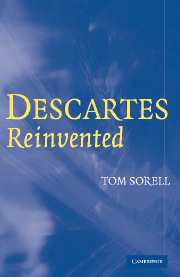Book contents
3 - The Belief in Foundations
Published online by Cambridge University Press: 20 July 2009
Summary
Enquiry has to start somewhere; but does that mean that there is a single preferred order of investigation, and that certain things have to be grasped before stable science of any kind is possible? Descartes's answer is ‘Yes’. There is a preferred order, and a starting point in just a pair of propositions: ‘I am thinking, therefore I exist’; and ‘God exists and is no deceiver’. These were the supposed foundations of science in general, and had to be taken in before anyone could have a stable grasp of physics, medicine, mechanics, or morals. By ‘stable grasp’ Descartes meant a grasp that would not weaken in the face of the hypothesis that we might be constituted to find the false entirely certain. No one now thinks that science has the structure Descartes described, or that physics in particular, as we now have it, can be thrown into doubt by the absence of metaphysical first principles guaranteeing the trustworthiness of our cognitive faculties. Does this mean that foundationalism cannot be part of an innocent Cartesianism? It depends on whether the claim to have arrived at foundations has to be attended by a theory like Descartes's of the structure of science, and whether the effort of arriving at foundations makes sense only when there is general disbelief in the soundness of the results of a certain branch of enquiry, such as physics. It depends, too, on whether what is foundational has to guide enquiry.
- Type
- Chapter
- Information
- Descartes Reinvented , pp. 57 - 84Publisher: Cambridge University PressPrint publication year: 2005



